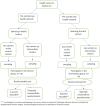Can mobile software-based physical activity education enhance the quality of life in perimenopausal women?
- PMID: 40144164
- PMCID: PMC11940084
- DOI: 10.4103/jehp.jehp_1919_23
Can mobile software-based physical activity education enhance the quality of life in perimenopausal women?
Abstract
Background: Menopause is a natural occurrence signifying the cessation of menstrual bleeding in middle-aged women. Perimenopause refers to a period of 2-8 years leading up to menopause, characterized by irregular cycles or the absence of menstruation for less than 12 months. The perimenopausal phase can be challenging for women due to the negative impact of associated symptoms on their quality of life. Recognizing the potential benefits of physical activity in mitigating these symptoms, this study aimed to evaluate the impact of physical activity education delivered via WhatsApp, using the Health Belief Model as a foundation, on the quality of life in perimenopausal women.
Materials and methods: This quasi-experimental study involved 80 women aged 40-50 recruited from comprehensive health centers in Isfahan. Cluster sampling was employed for participant selection. The study employed three questionnaires: the "International Physical Activity Questionnaire," "Menopausal Women Quality of Life," and the Health Belief Model Questionnaire. For the intervention group, education based on the Health Belief Model was delivered via WhatsApp via videos, posters, and podcasts every two weeks (a total of 5 packages). Additionally, exercise training videos were sent to participants. Data was collected two months after the intervention and analyzed using SPSS 26, with independent and paired t-tests applied (significance level: 0.05).
Results: The results indicated a significant increase in knowledge scores, Health Belief Model constructs, and physical activity levels within the intervention group, whereas no significant changes were observed in the control group. Notably, menopausal symptom scores decreased in the intervention group, particularly in psychological symptoms, and there was a significant decrease in the overall quality of life score (P = 0.018).
Conclusion: Providing education via WhatsApp, grounded in the Health Belief Model, enhanced physical activity levels and improved the quality of life among perimenopausal women. This approach holds promise for promoting well-being in perimenopause.
Keywords: Education; Health Belief Model; menopause; physical activity; quality of life.
Copyright: © 2025 Journal of Education and Health Promotion.
Conflict of interest statement
There are no conflicts of interest.
Figures
Similar articles
-
Association between physical activity and menopausal symptoms in perimenopausal women.BMC Womens Health. 2014 Oct 3;14:122. doi: 10.1186/1472-6874-14-122. BMC Womens Health. 2014. PMID: 25277534 Free PMC article.
-
Impact of perimenopausal symptomatology on quality of life in Mongolian women.J Obstet Gynaecol. 2022 Oct;42(7):3134-3141. doi: 10.1080/01443615.2022.2106829. Epub 2022 Sep 2. J Obstet Gynaecol. 2022. PMID: 36052870
-
[Benefits of a community physical exercise program prescribed from primary care for perimenopausal/menopausal women].Aten Primaria. 2022 Jan;54(1):102119. doi: 10.1016/j.aprim.2021.102119. Epub 2021 Oct 8. Aten Primaria. 2022. PMID: 34634454 Free PMC article. Clinical Trial. Spanish.
-
Efficacy of mind-body therapies and exercise-based interventions on menopausal-related outcomes among Asian perimenopause women: A systematic review, meta-analysis, and synthesis without a meta-analysis.J Adv Nurs. 2020 May;76(5):1098-1110. doi: 10.1111/jan.14304. Epub 2020 Feb 17. J Adv Nurs. 2020. PMID: 31950541
-
Hormone therapy for sexual function in perimenopausal and postmenopausal women.Cochrane Database Syst Rev. 2023 Aug 24;8(8):CD009672. doi: 10.1002/14651858.CD009672.pub3. Cochrane Database Syst Rev. 2023. PMID: 37619252 Free PMC article. Review.
References
-
- Hoga L, Rodolpho J, Gonçalves B, Quirino B. Women’s experience of menopause: A systematic review of qualitative evidence. JBI Database System Rev Implement Rep. 2015;13:250–337. - PubMed
LinkOut - more resources
Full Text Sources



